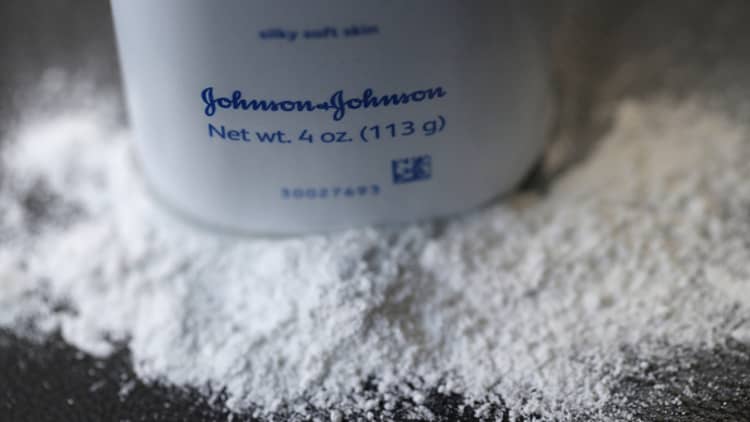
Attorney Mark Lanier, who won a nearly $4.7 billion talc verdict against Johnson & Johnson this summer, told CNBC on Tuesday that the recent plunge in shares of J&J plays into his hands in seeking a settlement with the company.
"This litigation, these problems can be resolved [for] much, much less than" than the roughly $50 billion loss in J&J's stock market value since Friday's Reuters report, alleging the company knew for decades about the presence of asbestos in its baby powder talc product, said Lanier. "It serves my purposes as a litigator to say, 'Yes, get their attention; keep driving the stock down.'"
Shares of Johnson & Johnson opened higher Tuesday, nearly wiping out the roughly 3 percent slide Monday, after The New York Times piled on over the weekend. But the stock has a way to go to recover Friday's 10 percent decline.
Lanier, founder and lead litigation counsel at his namesake law firm, represented 22 women, and their families, who claim J&J's talc-based products, including its baby powder, contain asbestos and caused them to develop ovarian cancer. In August, a Missouri judge affirmed the nearly $4.7 billion jury award. J&J said at the time that it was confident the decision would be overturned on appeal.
J&J sent a statement to CNBC after Lanier's interview. Orrick partner Peter Bicks, one of the lead trial lawyers for the company, wrote in regard to the talc cases: "The science and facts are clear: J&J's baby powder is safe and does not cause cancer. Studies of tens of thousands of women and thousands of men show that talc does not cause ovarian cancer or asbestos-related disease."
Of the recent media reports, Bicks wrote: "There is nothing new here. This issue was openly debated in the media, including the New York Times, for years in the 1970s, it was studied by the FDA in the 1970s, and the conclusion was that it had been a false alarm. The best scientists tested our talc and found no asbestos — then and now."
J&J Chairman and CEO Alex Gorsky said, "We always have empathy and sympathy for patients that have been diagnosed with cancer," speaking on CNBC's "Mad Money" on Monday evening. Gorsky also argued the science "simply doesn't support" some of the correlations being drawn by patients in the suits.
"I think if we look and we step back and take a broader look at the more recent cases, really over the last 12, 18, or even 24 months, there's been about 40 in total," Gorsky told CNBC's Jim Cramer. "About 35 of those have gone our way, either through decision and appeal [and] dismissal. The five outstanding, those are also under appeal."
He added, "We're confident in going forward, and we think that, frankly, the science stands behind us."
"If the company handles the litigation right, it's extremely manageable for a company the size and strength of J&J," Lanier said. "If the company continues to handle it wrongly, then I think the company is going to continue to have problems that cost it two, three, four, five times what it should."
Among Lanier's other major victories over his three decades of trial work were a $9 billion verdict in 2014 against Takeda Pharmaceutical and Eli Lilly over diabetes drug Actos and a $253 million verdict in 2005 in the nation's first trial over the Merck-made painkiller Vioxx. Both verdicts were later slashed on post-verdict motions or appeal.
"Every case ultimately settles," Lanier said in Tuesday's "Squawk Box" interview. "I don't know that I've ever had a case that went all the way to the U.S. Supreme Court and then it's paid in full. Every case finds resolution. At some point, it's a business decision for the litigants as well as for the company. And smart minds can prevail on that."
Monday evening on CNBC, Gorsky also defended J&J against those damaging reports from Reuters and The New York Times. "We unequivocally believe that our talc, our baby powder, does not contain asbestos," said Gorsky, who has worked at J&J since 1988 and became CEO in 2012. He also reiterated his company's categorical denial of the reports.
After Monday's closing bell on Wall Street, Johnson & Johnson announced plans for a $5 billion stock buyback, based on what the company said were "strong performance" and "confidence we have in our business going forward."
— CNBC's Elizabeth Gurdus and Angelica LaVito as well as Reuters contributed to this report.


